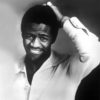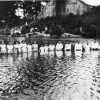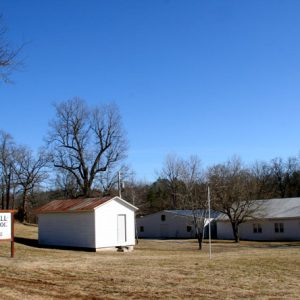calsfoundation@cals.org
Brockwell Gospel Music School
The Brockwell Gospel Music School offers instruction in choral and instrumental musical techniques for those who desire the improvement of church music. It operates every summer on a small campus in Brockwell (Izard County) at the intersection of State Highways 9 and 56. It was founded in 1947 as the Brockwell Music School, assumed its present name in 1962, and operates at its original site.
The singing-school tradition goes back to the time of the Second Great Awakening on the American frontier in the first years of the nineteenth century. This tradition contributed significantly to the growth and power of the great revivals that especially captivated gospel-hungry settlers in the frontier South in the first third of the century. Itinerant singing “masters” gave musical instruction to far-flung, often musically illiterate students. The students learned rudiments of music and the basics of Christian teaching for the purpose of their spiritual improvement.
In Arkansas, such instruction was offered both by itinerant teachers and more formal schools operating in stable locations, including the Hartford Music Institute, which opened in Hartford (Sebastian County) in 1921. People in Izard County have long kept the singing-school tradition alive, with the Izard County Singing Convention, which was founded in 1910, and a rich history of hosting singing masters who conducted musical instruction in local churches for many years before and after the founding of the singing convention. Building on this tradition, Orgel Mason, L. L. Floyd, Steve Jones, Jeff Cooper, and Thomas and Ethel Brockwell founded the Brockwell Music School.
Mason was a musician and piano tuner who began singing gospel music as a teenager and worked as a young man for the legendary Stamps-Baxter Music Company in Dallas, Texas. Stamps-Baxter ran a hugely popular marketing and promotional network throughout the South, as well as a successful network of gospel music schools under the name of the Stamps-Baxter Normal Music School. Mason became convinced the school could be replicated in north-central Arkansas to train amateur musicians without the commercialization so often present in the gospel music industry. The Izard County Singing Convention’s leader Lindsey Floyd, Mason, and friends and relatives of Mason and Floyd did the initial work in establishing the school, drawing support and students from the singing convention, which existed apart from the Brockwell School.
To teach the first classes, Mason and his co-workers recruited the Home State Quartet of Little Rock (Pulaski County), one of the numerous gospel singing groups of the day that traveled the South performing, selling copies of their original gospel tunes, and promoting the publishing company that kept their songs in print. The school’s leaders used teachers from throughout Arkansas and occasionally other southern states and prided themselves on always staffing the school with highly trained, skilled musicians. Teachers usually gave up parts of their summer vacations to teach without pay to keep costs low enough so most interested students could attend.
The school began operation with a tabernacle as the centerpiece of the original campus but had to borrow classroom space in local homes and businesses. Classes occasionally met outside under shade trees. In conjunction with the Izard County Singing Convention, Brockwell School leaders developed a campus of several buildings. They moved frame structures to the school through the 1970s, constructed a cement-block classroom building in 1991, and added a large auditorium in 2005.
After Orgel Mason’s death, longtime Brockwell teacher and manager Anna Floyd became the school’s manager, assisted by Loye Mason, a graduate of the school.
Unlike their traveling predecessors, the instructors at the Brockwell School maintain a set two-week curriculum at the same site every summer. Students range from young children to senior citizens who come from around Arkansas and from other states to improve their musicianship. The school also offers instruction in sight reading, conducting, and composition, as well as in singing by ear and shape-note singing. It uses the same curriculum it always has, concentrating on four-part, Southern gospel harmony based on the shape-note system developed in the nineteenth-century songbooks Southern Harmony and Christian Harmony. The school has a loyal following among its graduates, many of whom have sent their own children to attend the school, including members of the family of famed gospel composer Luther Presley. The school has had an average annual attendance of about 120 since it began keeping records.
For additional information:
Brockwell Gospell Music School. https://www.brockwellgospelmusicschool.com/ (accessed July 6, 2023).
Floyd, Anna. “History of the Brockwell Gospel Music School.” Unpublished manuscript. Brockwell Gospel Music School, Brockwell, Arkansas.
Massey, Tom. Interviews with Orgel Mason. Regional Studies Collection. Lyon College, Batesville, Arkansas.
Special issue on Brockwell. Izard County Historian 37 (July 2012).
David Stricklin
Butler Center for Arkansas Studies
 Music and Musicians
Music and Musicians Religion
Religion Brockwell Gospel Music School
Brockwell Gospel Music School 




Comments
No comments on this entry yet.